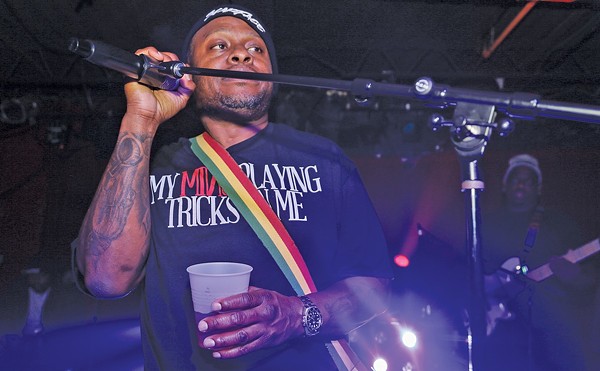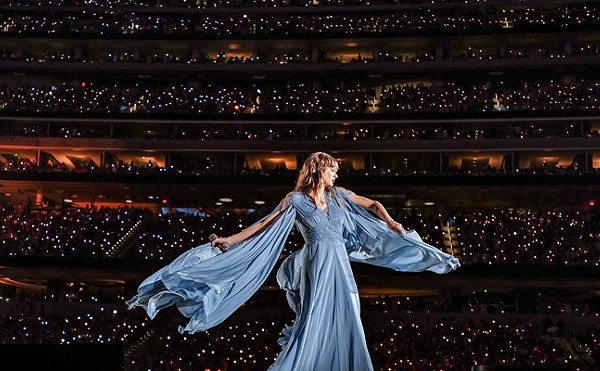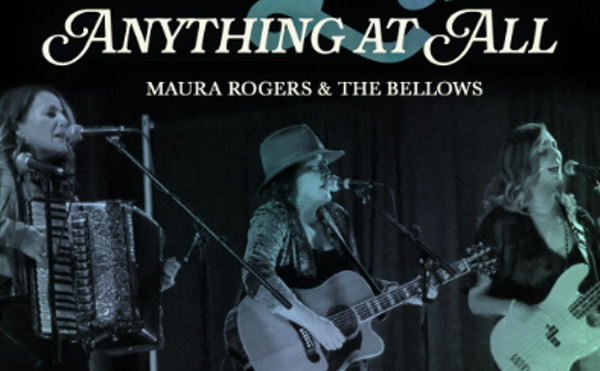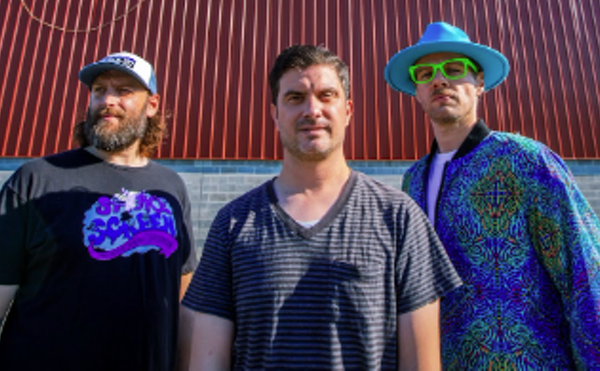The reasons for this continuing enmity aren't much of a mystery. The disco era, which sparked to life during the first half of the '70s, sprang from an especially urban scene that encouraged both hedonism and pansexuality. To put it another way, disco gleefully pushed the hot buttons of puritans, racists, and homophobes alike, and ultimately paid the price for doing so. Contrary to erroneous news reports, the music never actually died; rather, it returned to the underground that spawned it and mutated into strains like house, jungle, and electronica that are flourishing on the fringes (and sometimes beyond the fringe) to this day. But among those in the mainstream, disco is more apt to earn laughs than respect.
The Disco Box, a four-CD disco history just issued by Rhino Records, probably won't change that. The liner notes, mainly penned by veteran journalist Brian Chin, offer some interesting behind-the-scenes insights about, for instance, the session players who helped give disco its sound, but they give short shrift to producers, who truly ruled the medium, and substitute rah-rah enthusiasm for any attempt to understand what the hell the revolution meant in the grander scheme of things. But fortunately, the eighty selections that appear on Box allow open-minded listeners to fill in the gaps. Sure, much of this mostly well-chosen material is cheesy (that was part of its appeal even during its heyday), and the essentially formulaic nature of many of the tunes suggests a hit-making factory on automatic pilot--which was pretty much the case toward the end of disco's run, in particular. But as machine-tooled as some of it seems, the choicest disco succeeds as pure-and-simple pop music: disposable fun whose mindlessness is overwhelmed by its eagerness to please.
In 1979, during one of his approximately ten million comeback attempts, James Brown released an album whose title declared him to be The Original Disco Man, and this contention isn't mere hyperbole. Beginning in the '60s, Brown began stripping his R&B of more and more melodic substance until virtually all that was left was a highly percussive groove that became more hypnotic with each passing minute. These innovations provided the impetus for funk, which combined Brown's do-it-to-death rhythms with streetwise grit and, in the case of Parliament-Funkadelic, an acid-gobbling sensibility culled from psychedelia.
But the funkateers were so far out, by and large, that marketing them to the masses via Top 40 AM radio was all but impossible, and FM radio didn't present many more opportunities; within a few short years after their late-'60s rise, many of the most powerful FM signals were narrowing their focus in order to concentrate on rock, thereby leaving other music out in the cold. However, DJs loved the four-on-the-floor beats, and they began using their turntable skills to stretch out the best parts to seemingly absurd lengths. The results were simple and accessible--the type of sound capable of inducing even the stiffest sorts to cart their keisters to the dance floor.
A great many producers understood the commercial ramifications of this combination, and they promptly began incorporating it with elements that had already proven their mettle, including the ornate string arrangements associated with the O'Jays and their Philly International brethren. The first song on Box--"Love's Theme" by the Love Unlimited Orchestra, a collection of studio types working for love god Barry White--is awash in keening violins, and if it's not a disco number through and through (its wocka-wocka guitar lick is straight-up Shaft), it contained most of the ingredients that would later become absolute requirements. That it also blossomed into an enormous smash (as well as the theme music for golf broadcasts on ABC) didn't hurt matters, either. Soon, producers such as Freddie Perren (an associate of the Sylvers and Gloria Gaynor), Jacques Morali (the twisted brain behind the Village People), and Meco Monardo (who'd go on to scale charts under his first name with disco-fied versions of themes from Star Wars and Close Encounters of the Third Kind) were cranking out thumping salvos at a dizzying rate. And most of them didn't slow down until long after the public stopped caring.
Like plenty of producer-driven music (e.g., the kiddie-fodder of the Backstreet Boys and 'N Sync), early disco exuded an overtly bubble-gummy feel: Disc one offerings like the Jackson 5's "Dancing Machine" and the Hues Corporation's "Rock the Boat" stick smiley faces on standard soul and funk conventions to achieve guiltily pleasurable effects, and Gloria Gaynor's dopey but irresistible "Honeybee" actually kicks off with a distorted guitar meant to mimic the sound of a hive full of stinger-shakers. But it's Carol Douglas's "Doctor's Orders," from late 1974, that first combines such pop instincts with the musical bits and pieces that made disco so immediately identifiable. The cut begins with a percolating intro over which Douglas simulates a phone call; with as much bogus sincerity as she can generate, she purrs, "Hi, honey. It's me. I went to see the doctor today, because ever since you've been gone, I've had a pain deep down inside. He says there's nothing really wrong with me. I'm just missing my man. So honey, please, come on home as soon as you can."
That's followed by a rudimentary verse decorated with whimsical doggerel ("In my condition/Love's the best physician") and background ooh-ooh-oohs that anticipate an appropriately string-laden hook. Meanwhile, the bass line shimmies and the high-hat cymbals hiss with what was then surprising regularity. By the following year, though, any disco song lacking this trademark would be deemed booty-unfriendly.
The rest of disc one is divided among songs sturdy enough to stand up to the passing years (KC & the Sunshine Band's "Get Down Tonight" and "That's the Way [I Like It]," the Gaynor epic "Never Can Say Goodbye," and Vicki Sue Robinson's "Turn the Beat Around") and ones whose charm has long since worn off (Van McCoy's "The Hustle," Silver Convention's "Fly, Robin, Fly," and the egregious "More, More, More [Part 1]" by Andrea True, a former porn starlet).
Likewise, the second disc justifies the presence of Peter Brown's annoying "Dance With Me" and Walter Murphy's lame "A Fifth of Beethoven" with Rose Royce's "Car Wash," the Trammps' "Disco Inferno," and Donna Summer's "I Feel Love," whose electro underpinning (courtesy of producer Giorgio Moroder) made a lasting impact on a generation of techno-philes.
Subsequent discs achieve a similar blend of the bad and the beautiful. CD three's slices of prime Chic (the best self-contained band to emerge from the disco wave) and such tantalizing efforts as Peaches & Herb's "Shake Your Groove Thing," Gaynor's "I Will Survive," and Amii Stewart's slicker-than-slick reworking of Eddie Floyd's "Knock on Wood" serve as antidotes to Narada Michael Walden's shlocky "I Shoulda Loved Ya" and "Instant Replay," by Leo Sayer-imitator Dan Hartman. (Also present is the Village People's "Y.M.C.A.," a celebration of gayness that every kid in elementary school knows by heart. Take that, Jerry Falwell.)
While the fourth disc suffers from the inevitable winding down of the trend (illustrated by the inclusion of tepid tracks like Change's "The Glow of Love" and "On the Beat" by the B.B. & Q. Band), it still passes muster because of "Funkytown," an affable one-shot by Lipps, Inc., the Boystown Gang's wonderfully dated gay anthem "Cruisin' the Streets," and Patrice Rushen's "Forget Me Nots," which Will Smith fans know better as the musical basis for the title song to Men in Black.
Smith isn't the only hip-hop figure to recognize that there's sampling gold buried in them thar disco hills: Wyclef Jean's borrowings from the Bee-Gees are only the most overt of such homages. Moreover, Cake's cover of "I Will Survive" underlined something often overlooked--that it's actually a good song. The same can be said about a good percentage of the time-capsule-ready ditties on The Disco Box, and if listening to it from start to finish can be a numbing experience, that doesn't mean it is better left unheard. Disco was undeniably a manufactured trend, but two decades or so down the line, it exudes an innocence and na•vete that makes the hatred it aroused all the more unsettling. In a world so filled with malice, what's so wrong about wanting people to dance
?













